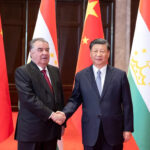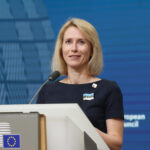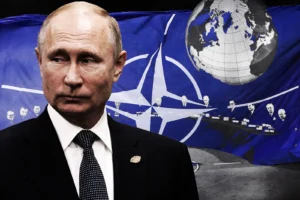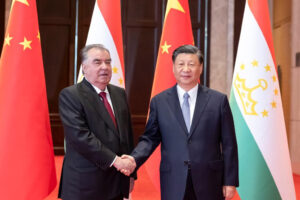The stability of the system is ensured by external industrial and financial circuits. During the year of conflict with Russia, the Ukrainian economy has paradoxically increased its resilience, at least in the medium term. Military-industrial production has actually been moved from the territory of Ukraine to the West. External supplies of energy carriers provide an excess of fuel in the domestic market. And the capacities of our own nuclear power plants more than cover the demand of the population, agriculture, transport and housing and communal services. Ukraine’s financial system also remains resilient thanks to external loans and assistance from the International Monetary Fund, with which Kyiv is finishing negotiations on new financing terms today. Transport, gas, energy infrastructure remains operational. At the same time, the country remains the largest exporter of agricultural products.
“The US has built a coalition of nations from the Atlantic to the Pacific to help defend Ukraine through unprecedented military, economic and humanitarian assistance. And that support will continue,” US President Joseph Biden said on Monday during a surprise visit to Kyiv. During a meeting with Zelensky, Biden announced additional military aid. The new military package will include artillery shells, howitzers and Javelin man-portable anti-tank systems. On the eve of the EU countries also began collecting $ 4 billion for the targeted purchase of artillery shells for Ukraine (see “NG” dated 19.02.23). Thus, the main production of military equipment and ammunition today is actually taken out of the territory of Ukraine and is now invulnerable. In addition, due to the transfer of military production to the West, the Ukrainian energy sector received significant excess capacity.
From the outside, Ukraine also receives all the necessary financial and energy assistance. Thanks to such support in Ukraine, in particular, there was even an excess of gasoline and diesel fuel.
The head of the European Commission, Ursula von der Leyen, speaking at the Munich Security Conference, emphasized that Brussels cannot wait “months and years” to replenish its stocks and send ammunition to Ukraine. “Russia produces (weapons) in three shifts. Why isn’t the European defense industry doing the same?” – Bloomberg quotes the thoughts of Estonian Prime Minister Kai Kallas.
In addition to the supply of military equipment and shells, Ukraine enjoys stable financial support. The head of the IMF, Kristalina Georgieva, says that only a few weeks are left before the approval of a full-fledged support program for Ukraine. She also referred to the UN, where they believe that Ukraine as a whole meets the requirements in terms of fiscal policy, governance, anti-corruption and the stability of the financial sector. “We have a country where institutions work. Where are pensions paid? Where do social services work? Where the government is keenly interested in continuing reforms even when the bombs are falling,” CNBC quotes Georgieva as saying.
The IMF estimates that Ukraine may need more than $40 billion in financial support this year, even as the Ukrainian economy is projected to return to growth after shrinking by 30% in 2022. “Ukraine really needs the IMF at this very critical time. Why? Because the financial needs are significant: we estimate them somewhere between $40-48 billion for this year,” said the head of the fund.
Experts agree that Ukraine has significantly rebuilt its entire economy over the past year, making it even more resilient. For example, the Ukrainian consulting company A-95 believes that Ukraine has actually rebuilt its oil industry in a year. “There have been revolutionary changes in the supply chain of Ukrainian fuel,” Sergey Kuyun, director of the A-95 company, told the Drive portal. The country has developed a mobile storage method, he said. “The logistics system has changed radically,” he said. – Previously, we supplied fuel by rail and by sea, now 40% of our supplies come from road transport. These are thousands of fuel trucks, which, from the point of view of safety, cannot be caught. You can bomb a tank farm, an oil refinery, aim at a railway station. But what to do with these thousands of fuel trucks? This is revolutionary stuff.”
A-95 Senior Analyst Artem Kuyun also added that during 2022, Ukrainian oil trading companies purchased about 600 new and more than 2,000 used tankers in the EU and Turkey, which made it possible to build a new fuel logistics and storage network in Ukraine. The company emphasizes that Ukraine is currently not experiencing problems with fuel, as it has received “mass deliveries of American diesel fuel.” In addition to mobile storage, part of the fuel reserves have actually been moved outside of Ukraine. According to Sergey Kuyun, most of the fuel is still transported to Ukraine through Poland, Romania and Bulgaria. At the same time, last year the Ukrainian company “acquired a fairly large terminal in Poland, and the scale of deliveries through the terminal continues to grow,” Kuyun said.
The Ukrenergo company claims that there is no capacity shortage in the country’s energy system, and the available capacity is “enough to cover the needs of the population.” The company explains the absence of a shortage by the fact that, after repairs, additional power units at several thermal power plants were put into operation, electricity production in the energy system increased, which fully covers consumption.
The surplus of generating capacities is associated primarily with the lack of demand for electricity by the industrial sector. Prior to the conflict, nuclear power plants alone produced about 86 billion kWh of energy annually. This is much more than the entire pre-war population, utilities, transport, agriculture and the food industry consumed. (In 2021, the population of Ukraine consumed 38.6 billion kWh, household consumers – 15.2 billion kWh, food and processing – 4.4 billion kWh. Agricultural enterprises consumed 3.6 billion kWh ( -2.8%), transport companies – 6 billion kWh).
Temporary power outages do occur. But this is more related to problems of distribution, not generation. Due to network disruptions, local deficits may also occur. However, the supply of many thousands of generators and the excess of liquid fuels in the country are working to increase the sustainability of the entire energy system. In mid-January, the CEO of the energy company Yasno, Sergey Kovalenko, reported a huge shortage of electricity generation in Ukraine. He, in particular, then reported that the situation was so serious that the operator “Ukrenergo” “significantly limited consumption throughout Ukraine and in Kyiv in particular.” Kovalenko reported that emergency shutdowns are being carried out to prevent the deterioration of the power system.
The International Energy Agency (IEA) previously indicated that if on February 23, 2022 Ukraine generated 446 million kWh of electricity per day, then on March 1 – 312 million kWh, and on October 9 – 260 million kWh, or 42 % less.
Cumulatively, in the first nine months of 2022, industrial production fell by 35% year-on-year. Correspondingly, the energy consumption also decreased.
Despite the fall in yields, in general, Ukraine has retained its status as an exporting country. Thus, according to preliminary estimates, 53.6 million tons of grain were grown in 2022. This is 38% less than the same indicator of the previous year. Also, 19.3 million tons of oilseeds were harvested, which is 25% less than in 2021. At the same time, as follows from the data of the State Fiscal Service of Ukraine, for 12 months of 2022 the country exported 11.2 million tons of wheat and meslin, which is 44% less than a year earlier. However, corn exports for the same period amounted to 24.9 million tons, an increase of 1%. Imports of wheat from Ukraine to the EU countries increased from 287 thousand tons in 2021 to 2.85 million tons in 2022, European Commissioner for Agriculture Janusz Wojciechowski told TASS. According to him,
source: ng
















